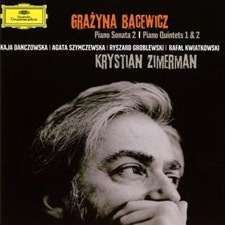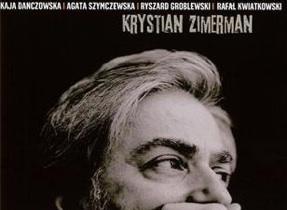
Grażyna Bacewicz may not be a household name even among the cognoscenti of the 20th-century piano repertoire. She was well-known as a violinist and composer in her native Poland, and was an integral member of the underground music scene during World War II. She must have also been an excellent pianist, as she gave the premier performance of her own landmark Sonata II for piano.
Some may recall that Krystian Zimerman performed the sonata during his 2009 tour marking the composer’s centennial birth year (see an SFCV review). Baceqicz wrote her sonata in 1953, during the height of Poland’s oppression by the Stalinist regime, in which political opponents were being tried and executed. It is certainly not atypical for artists to find outlet for their anguish during oppressions; this work is no exception. Other readers may recall that Zimerman protested against the presence of the American military in Poland, and a number of the audience walked out of the concert in Los Angeles.
Listen To The Music
Piano Sonata No.2 - 3. Toccata. VivoPiano Quintet No.1 - 2. Presto
Zimerman first recorded the sonata in 1977 on vinyl when he was merely 20 years old, shortly after his victory at the Chopin International Piano Competition. With this new recording of the sonata, as well two Baceqicz piano quintets, Zimerman returns to the roots of his stellar (if not controversial) career.
From the maestoso opening, composed of ascending notes in perfect-fourth intervals, the sonata appears to represent the suffering, pain, reminiscence, and perhaps hope experienced when it was composed. Zimerman’s driven interpretation of the initial theme in the first movement evokes a frantic escape from the invisible oppressor, through the dark streets and alleys of Warsaw. A calm but brief second theme summons up a forgotten folk song, recalling the warm past, possibly remembered through colored glasses. Then the listeners are reminded that the reality was bleak.
The languid second movement, initially almost jazzy, with its lyrical line suspended above extended chords, develops into a solitary prayer, of a sort. It is, however, full of agonizing tension, with ringing, dissonant, major-seventh intervals ringing like bells in the middle section. Following a short fugal section, it returns to the jazzy theme, but in a different key. In the end, it lets out a deep sigh back to the original key. It’s magical.
The short Toccata is an oberek, one of Poland’s national dances. The atmosphere is humorous though somewhat uncomfortable, as Zimerman presents a vibrant scene with a full range of emotions. The brutal finale suddenly interrupts the dance, and it is executed with much drama, but with violent efficiency.
The sonata is accompanied by Bacewicz’s two piano quintets, performed with a string quartet that Zimerman assembled specifically for both the centennial tour in Poland and this recording. The quintets are decidedly of the late-Romantic tradition, with elements of folk songs and dances. The ensemble of the quintet and the balance are exemplary, and Zimerman coheres well with the quartet. Bacewicz also builds the tonality in the first quintet through an assemblage of fourth or fifth intervals, lending perhaps a jazzy character (to modern ears). The eerie, often-pensive second quintet is freer in its tonality, with nearly percussive use of the string instruments in places, not unlike Bartók.
Apparently, Zimerman was unhappy with this CD. He was negotiating with Polish Radio to include a recording of Bacewicz herself playing violin, but the talks ended up in a fiasco again. Zimerman then cancelled his Poland tour in anger and instead will be performing in Berlin and Paris. This saga was apparently the reason for the CD’s late release, two years after it was recorded.
Despite all the backstory controversy, this CD does real justice to the rich music of Bacewicz, who deserves to be recognized as one of the more significant composers of the last century. We are fortunate to have a new window into a world previously neglected due to political oppression.

